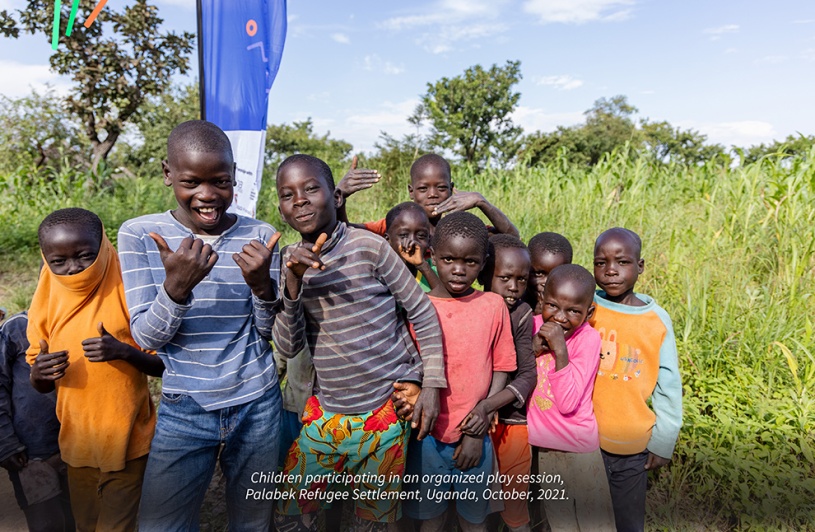PlayMatters in year one
Jan 05, 2022

About PlayMatters
Slightly over year ago, the $100 million PlayMatters project led by the IRC started its 1st year of implementation in East/Horn of Africa (Uganda, Tanzania, and Ethiopia). The project is being implemented by a consortium led by the International Rescue Committee, and includes Plan International, War Child Holland, Innovations for Poverty Action, and the Behavioural Insights Team in partnership with the LEGO Foundation.
The project seeks to improve holistic learning and wellbeing outcomes for refugee & host community children, using learning through play methodologies. Right from infancy, children have an amazing natural potential to learn about their environment through play. As they grow up in today’s dynamic world, it becomes more important for them to build holistic skills which can help them thrive in the future. For children affected by crisis, the need for positive experiences and coping skills that can counterbalance negative factors in their lives is therefore even more critical.
Laying the foundation
The project started with conducting behavioural mapping to better understand the perceptions, attitudes, and opportunities towards mainstreaming learning through play among our target communities. This involved speaking to educators, parents/caregivers, and community leaders in order to build a project foundation that is contextualized and user-informed. Using insights from this process, the consortium developed and conducted small-scale pilots of play-based learning content in schools, at home, and within community structures. Through a build-test-learn approach, the learning through play methodologies are aimed at nurturing creative, cognitive, physical, social, and emotional skills among 800,000 refugee and host community children aged 3-12+.
Responding to the COVID-19 education emergency
As this foundation was being laid, PlayMatters also launched a family-friendly home learning program to support learners who were stuck home due to school closures to curb the spread of the COVID-19 pandemic. This program included developing and distributing interactive learning packets in 18 languages, which contain fun learning games in reading, math, and socio-emotional learning. It also included developing and airing radio shows in 8 languages to complement the packets. The packets and radio shows both promoted COVID-19 safety, health, and hygiene messages, which all reached over 200,000 children in the three countries.
Supporting resumption of learning amidst crisis in Tigray
As part of the efforts to support the resumption of learning in parts of Tigray, Ethiopia affected by the conflict, PlayMatters working in collaboration with IDP community representatives provided access to early childhood education services for young children in three IDP sites in Shire. The PlayMatters consortium distributed learning supplies like crayons, papers, pens, pencils, books, chalk, and markers.
The PlayMatters at Home learning packets were also distributed, and educators were trained on how to use them to facilitate/engage in playful learning activities with children. This contributed to overcoming trauma and improving on their wellbeing.
Policy & advocacy
Working with governments and other stakeholders in PlayMatters’ content development and rollout process aims to strengthen the national education systems to support refugee children through incorporating learning through play in the national curriculum are also central to the project. To this end, PlayMatters is continuing to cement relationships with Ministries of Education and others, especially government agencies tasked with curriculum development, teacher professional development, and children’s/community wellbeing.
Human centered design content development process
2021 saw PlayMatters develop ‘’starter pack’’ content for the promotion of learning through play in school, at home and in the community. This content will be tested, refined, and eventually scaled in collaboration with government and end users. This content supports:
- Teachers integrate learning through play in school
- Parents and guardians promote learning through play at home
- Community leaders advocate for learning through play in the community
Human centered design is a problem-solving approach that begins by cultivating a deeper understanding of a challenge or context and places end-users at the center of the design and implementation of the solution. PlayMatters is following this approach in our pathway to scale by involving end-users and other stakeholders in drafting and iterating learning through play content.
Monitoring, evaluation, learning and research
PlayMatters is also keen on building the evidence base on learning through play. Till now, most research on learning through play has been conducted in high-income countries with children under five. PlayMatters is one of the first large-scale initiatives to advance learning through play approaches in developing countries, especially in refugee settings and also including primary-aged children.
The consortium is thus committed to building this evidence with the overarching question being examining learning through play approaches on children’s holistic learning outcomes and resilience. This research is tied within the project’s monitoring and evaluation frameworks, theory of change, and scaling model. PlayMatters conducted an evidence synthesis review focusing on how learning through play in humanitarian and low resource contexts can be delivered through teachers, parents and in communities to improve holistic learning outcomes for children. Read the report here:
What's coming up?
In 2022, PlayMatters will continue working with end users and government stakeholders to test, refine and eventually scale up the most effective interventions. This includes strategies and resources that teachers can use to incorporate learning through play in lesson planning and teaching, as well as resources that parents and community can use to facilitate learning through play at home and in community spaces.
View/download our 2021 in pictures newsletter: